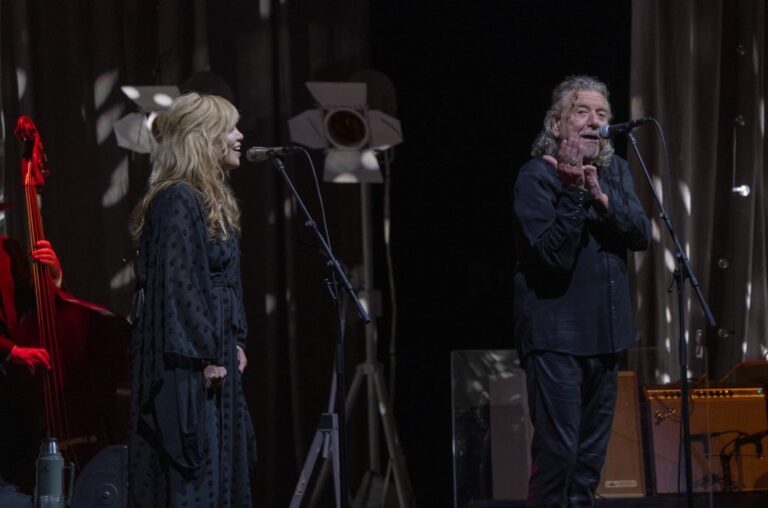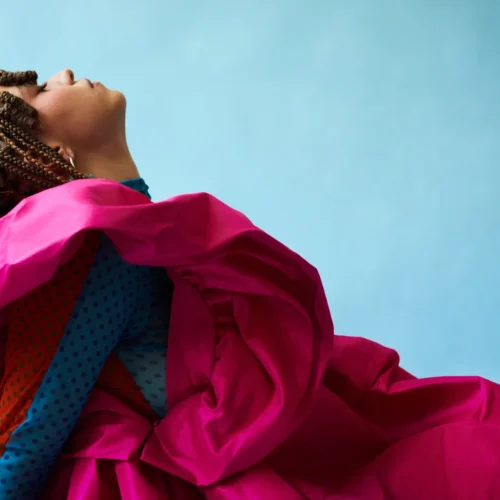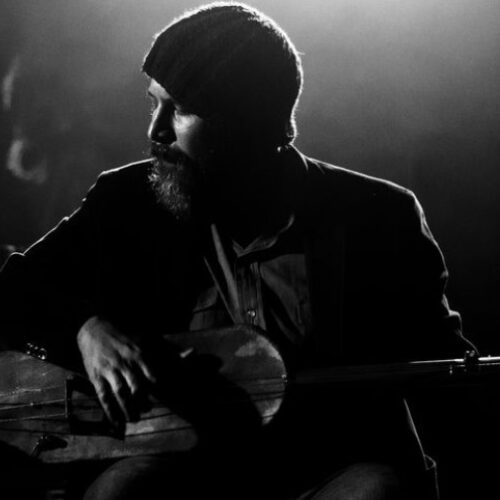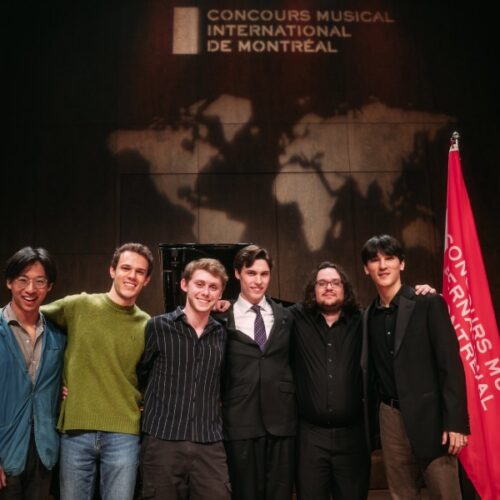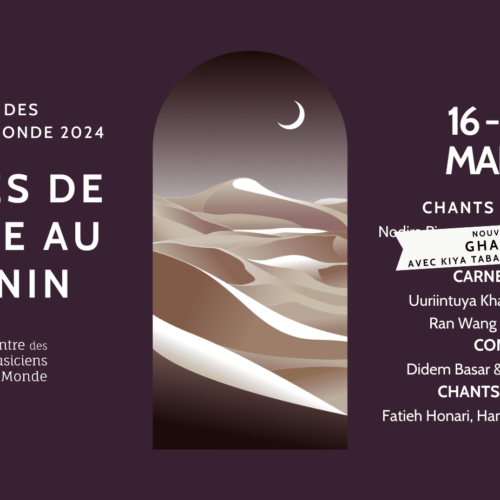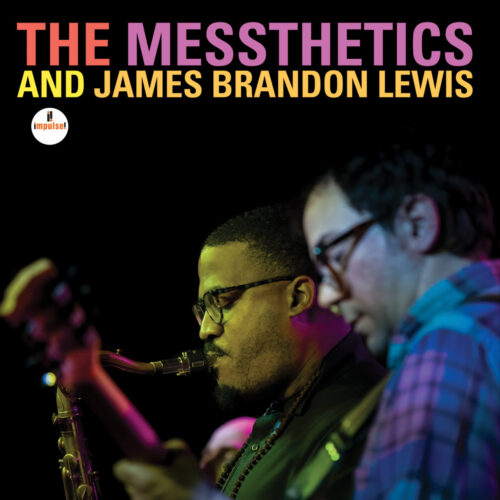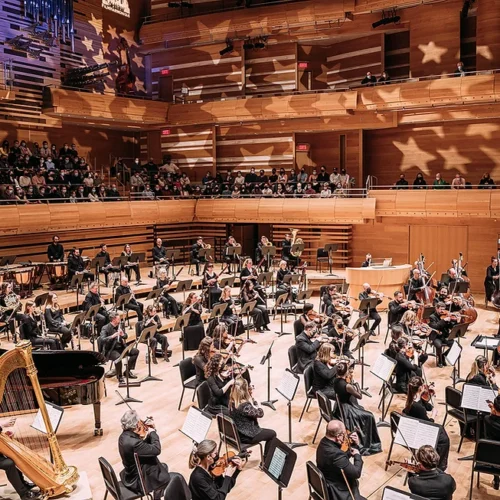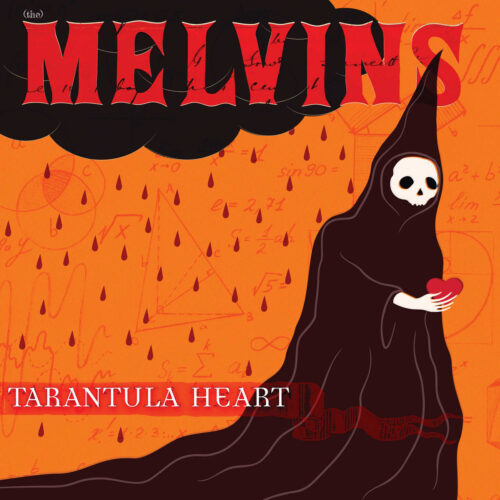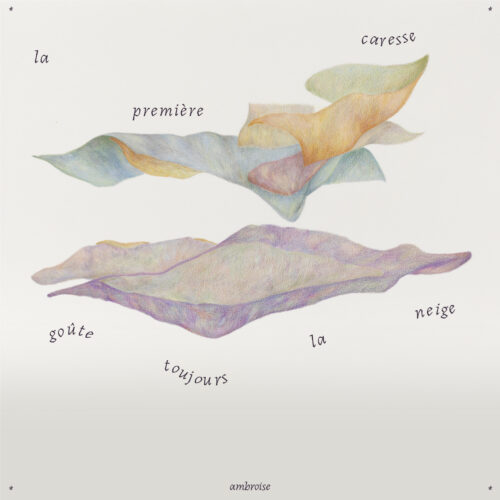Alison Krauss & Robert Plant: Mastery, Refinement, English Touch, Americana… Memorable !
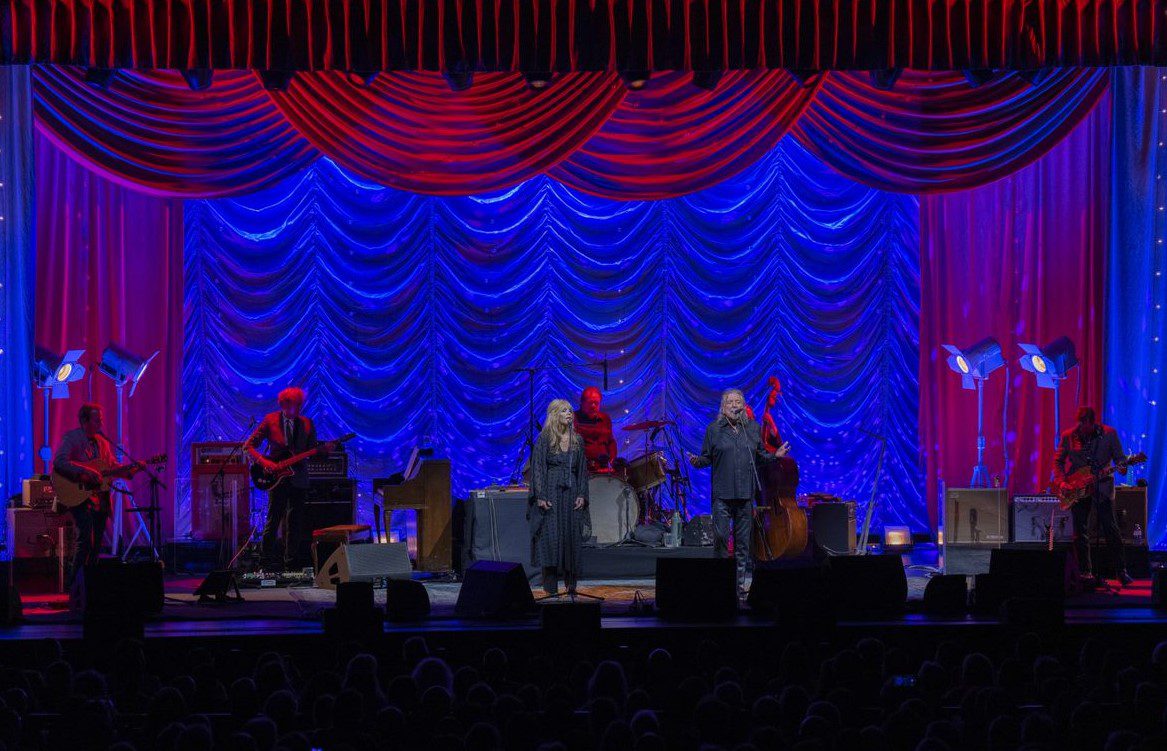
crédit photo: Victor Diaz-Lamich
It’s worth pointing out once again: very few popular artists are capable of nurturing their inspiration all the way to the end of the road, and Robert Plant is one of those rare iconic figures to have achieved this feat. On Friday evening at Salle Wilfrid-Pelletier, a concert of the highest quality once again eloquently demonstrated this: the superb tandem formed with Americana artist Alison Krauss and an exceptional band.
Robert Plant’s longevity is also due to the consistency of his approach over a lifetime. Let’s not forget that Led Zeppelin started out as a British band inspired by American rock’n’roll, blues, and folk, with the particularity of considerably beefing up their sound through the trances generated by the heavy rhythms of the late John Bonham, the acid riffs of guitarist Jimmy Page and Robert Plant’s paroxysmal voice. We’ll also remember the inspired use of oriental referents and brilliant arrangements by bassist John Paul Jones, inspired by modern Western classical music.
All this was perceptible on Friday night (except the classical music) but in a very different context. The line-up featured top-flight American musicians, the crème de la crème of Americana – Jay Bellerose, drums, Stuart Duncan, banjo, cello, mandolin, Viktor Krauss, bass, guitar, JD McPherson, guitar and opening act Dennis Crouch, double bass. Without a doubt, this instrumentation was conducive to all kinds of crossovers between the constituent elements of American popular music, and also to brilliant adaptations of Led Zep.
Tandem covers of “Rich Woman” (Lil’ Millet), “Fortune Teller” (Benny Spellman), “Can’t Let Go” (Randy Weeks), “The Price of Love” (Everly Brothers), followed by a perfect Led Zeppian rereading of “Rock and Roll and” an inspired cover of “Please Read the Letter” (Plant and Page), followed by “High and Lonesome” (Plant and T Bone Burnett), “Trouble With My Lover” (Allen Toussaint & Leo Nocentelli), “In the Mood” (Plant), then a pair of traditional songs with a pair of soloists, Marty Groves and Gallows Pole, before drawing to a close with a magnificent orientalized adaptation of a Led Zeppian folk song, “The Battle of Evermore.” We close the books in total rapture with “When the Levee Breaks” (Memphis Minnie and Kansas Joe McCoy).
Half a century after reaching rock’s pinnacle, Robert Plant has never abandoned these referents, yet he is the only member of Led Zep to go down the path of great creation – although John Paul could still be relevant.
So, for the past fifteen years, Plant has been exploring the foundations of Americana culture as few Britons have done on such a high level – blues, rock, bluegrass, Louisiana R&B, folk, country, Appalachian music, and so on. He does it in North America as well as in Europe, with Band of Joy (2010), Lullaby and the Ceaseless Roar (2014), Carry Fire (2017) and Raising Sand (2007) and Raise the Roof (2021), his two duet albums with Alison Krauss, being applauded in turn. Understandably, Raising Sand is the gateway to this extraordinary cycle. Needless to say, Alison Krauss, a singer, and fiddler exemplary for her aesthetic allegiance to country-folk-American singing and traditional fiddling, forms an ideal duo with Led Zep’s ex-frontman.
And that’s exactly what we saw on Friday night at FIJM, even more so than in 2011 when Plant performed Americana-style at PdA with the inspired and capable Buddy Miller on musical direction. Although … it was just as excellent 12 years ago. This just goes to show how enduring this English singer is, one of the greatest of them all.
Alain Brunet
TEKE::TEKE, all the elements for a celebration of creativty

crédit photo Frédérique Ménard-Aubin
In our interview with TEKE::TEKE, they were a little nervous about having enough people attend their FIJM performance, but really they had nothing to worry about. Playing to a packed house at the Club Soda, this evening was a celebration of this unique Montreal band, with an audience of friends, family, and a lot of fans.
The whole evening had a sense of spectacle to it as the septet ceremoniously took to the stage with some film music behind them. Setting the tone with “Gotoku Lemon” – an excellent introduction to their art-rock meets eleki soundworld – any looks of hesitancy quickly vanished, and it quickly dawned upon the audience that we were in for something special.
Maya Kuroki, the siren at the helm, had a bewitching stage presence. Clad in traditional Japanese dress, her voice carried the weight of ancient folklore, piercing the veil between reality and imagination. She would dance and sway, leading the congregation into a trance-like state – “tonight we are all phantoms” she says. The megaphone was an especially nice touch!
Behind her, the sextet swiftly played through their unique, funky, cinematic arrangements, and the setlist was mostly a showcase for their new album Hagata. The energy they bring is truly contagious and I love that the band leans into the theatricality of it all. They put on a show in the truest sense of the word and could tell that the band members were living their best lives up there. TEKE::TEKE’s music is a celebration of creativity, of cross-genre and cross-cultural
experimentation, and to be a part of that celebration was a privilege.
Varun Swarup
BADBADNOTGOOD’S AUDIO-VISUAL EXPERIENCE
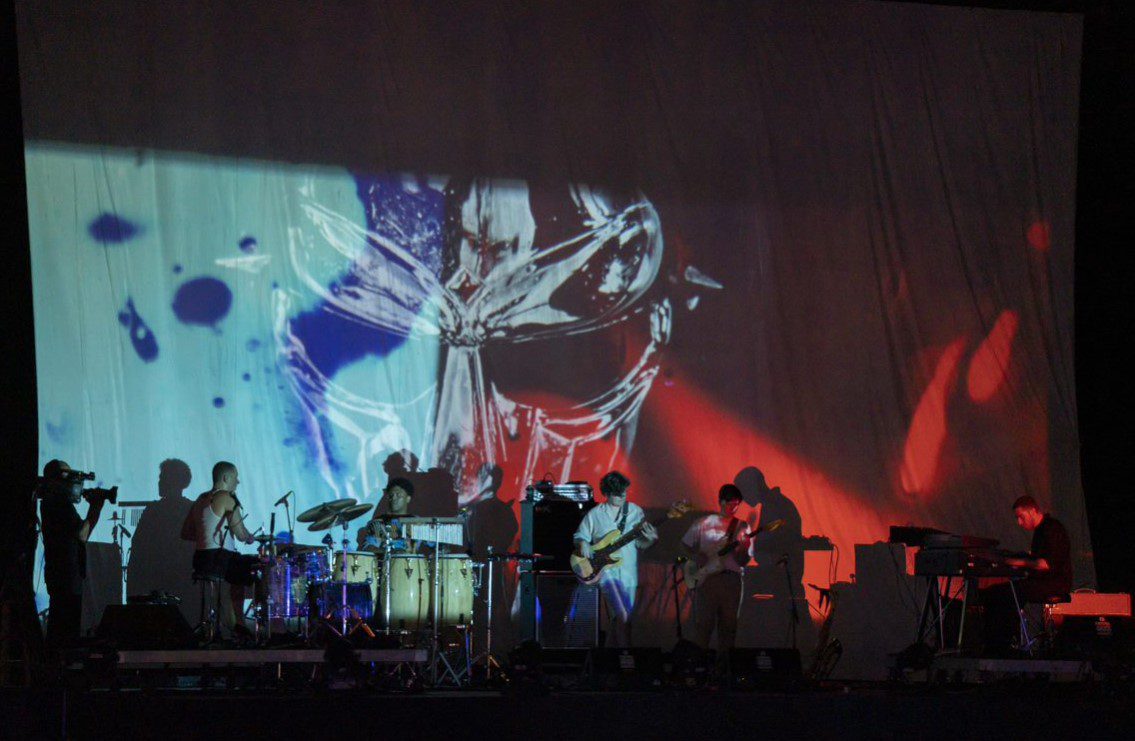
crédit photo: Benoît Rousseau
It wasn’t bad, but it wasn’t good … It was BADBADNOTGOOD, the shape-shifting instrumental jazz monster three-piece, though they played live as a five-piece on the main stage of FIJM. The set began with a recorded, way too loud “War Pigs,” before bassist Chester Hansen flipped on his fuzz pedal. It started more like a doom rock show than a jazz one and the crowd seemed a little weirded out, but once the rest of the band—Alexander Sowinski on drums, Leland Whitty on saxophone and guitars, Felix Fox on keys, and Juan Carlos on world percussion, came out the show took shape as they dove into “Signal From The Noise,” off the latest album, Talk Memory.
This time the Toronto outfit came loaded with a fantastic 16mm film backdrop, calling the show an “audio-visual experience” multiple times. The band has been missing founding member Matthew Tavares on keys since 2019 and has replaced him live with Felix Fox, an equally measured keyboard player, but the core three remaining members were the main stars of the show, each taking their own grooving improvised solos between songs from Talk Memory. Sowinski took the role of the show’s hype man, urging the crowd to jump, clap, and ‘woo’ at certain, scripted points.
There were a few improvised tributes to the late Gal Costa and MF Doom, which got the crowd bumping, but nothing compared to when they played “Lavender” off of IV, arguably their most put-together jazz hooky album. I’ll say that Talk Memory is a more enjoyable experience live than the recording, and though the set mostly consisted of that and I was hoping for more of IV and maybe some Sour Soul renditions, it was still a memorable show.
Stephan Boissonneault
FELP and Friends’ UFO land on the Esplanade

The Besançon-born multi-instrumentalist and producer brought his recent album HELP and other surprises to the Club Montréal TD stage.
After a long, atmospheric intro with undulating keyboard-bass and saxophone tones, Félix Petit took over the background and let the guests featured on his album perform one by one. Laurence-Anne plays the sinister Dino, whose post-chorus propulsion always seems to come out of nowhere. Then the mic is taken over by Klô Pelgag, with her dreamy nonchalance, performing Babyfoot, an icy song that demands such an attitude. Greg Beaudin, HAWA B, Besançon rapper Miqi O, and Bellflower spearhead Em Pompa all took to the mic for the songs that feature them.
The concert starts to surprise from the halfway point, as Félix Petit and his musicians begin an instrumental section. What seems to be a simple interlude, in the end, continually bends and changes. The music alternates between rhythms, each more interesting than the last. At the end of this ten-minute or so medley, you almost forget that there’s one last guest left, but you soon remember… because Hubert Lenoir arrives and immediately steals the show, shines, rocks, and takes control of the stage to an overwhelming finish. Hard to see him as only a guest artist.
Although the live setting doesn’t allow for as much detail as HELP offers in our ears, this show, with its team of star players, was truly worthy of the world’s greatest jazz festival.
Théo Reinhardt
Mali Obomsawin: The Aboriginal Renaissance Involes Jazz
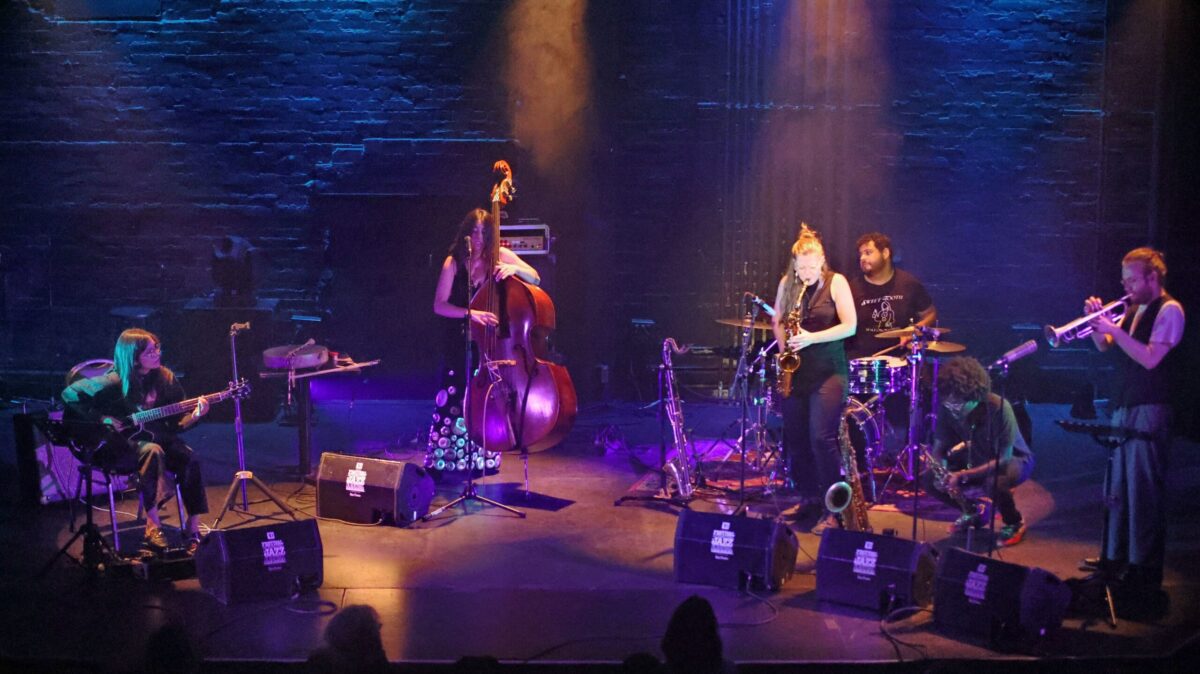
crédit photo: Pierre Langlois
Since we’re still in the midst of a renaissance in Aboriginal culture, any new manifestation of creativity titillates our curiosity, and that of Abenaki bassist Mali Obomsawin is no exception. The Studio TD was packed for her first concert as a sextet: Magdalena Abrego (guitar), Scott Bevins (trumpet), Allison Burik (clarinet), Noah Campbell (saxophone), Zack O’Farrill (drums), Mali Obomsawin (double bass and vocals).
The bandleader grew up in New Hampshire, but knows Odanak very well, an Abenaki stronghold not far from Pierrevielle, near the Saint-François River and Lake Saint-Pierre. She expresses herself in Angais and Abenaki, and is fully committed to asserting her Aboriginal identity, along with an acerbic and perfectly legitimate critique of white colonialism and Catholic oppression.
Musically, this desire to update aboriginal cultural heritage in a jazz context translates into a contemplative aesthetic, occasionally punctuated by jolts and eruptions. Native songs are used as melodic vectors around which improvisations develop in real-time. Tempos are generally slow. In fact, lament and anger, but also pride and hope, manifest themselves in an apparent calm whose nature we come to decipher.
Mali Obomsawin’s native melodies and rhythms are simple and pure. Integrating these traditional materials into contemporary jazz with a little touch of free improv, a necessarily more complex musical practice, is an essential step in the development of First Nations through musical creation. The double bassist, singer, and leader can count on a solid musical education in contemporary chamber jazz, as can her colleagues, without however revealing an exceptional level of playing.
Nonetheless, we have a good time with Mali Obomsawin, enjoying her playing, singing, and direction, as well as her touching cover of Buffy Sainte-Marie’s « Little Wheel Spin And Spin ».
And we’re curious about what’s next. Aboriginal jazz doesn’t have so many practitioners, and we know mainly (and not enough) about swing singer Mildred Bailey (1907-1951), from the Coeur d’Alene nation in Idaho, an authentic pioneer of jazz singing who was a great influence on the greats – Ella Fitzgerald, in particular. We also know Jim Pepper (1941-1992), a fine tenor saxophonist from the Muscogee Creek nation, who was responsible for the hymn “Witchitai To,” known to all Robert Charlebois fans without necessarily knowing its origins. There are certainly more if you do your research, and we imagine there will be many more in the not-too-distant future.
Alain Brunet
